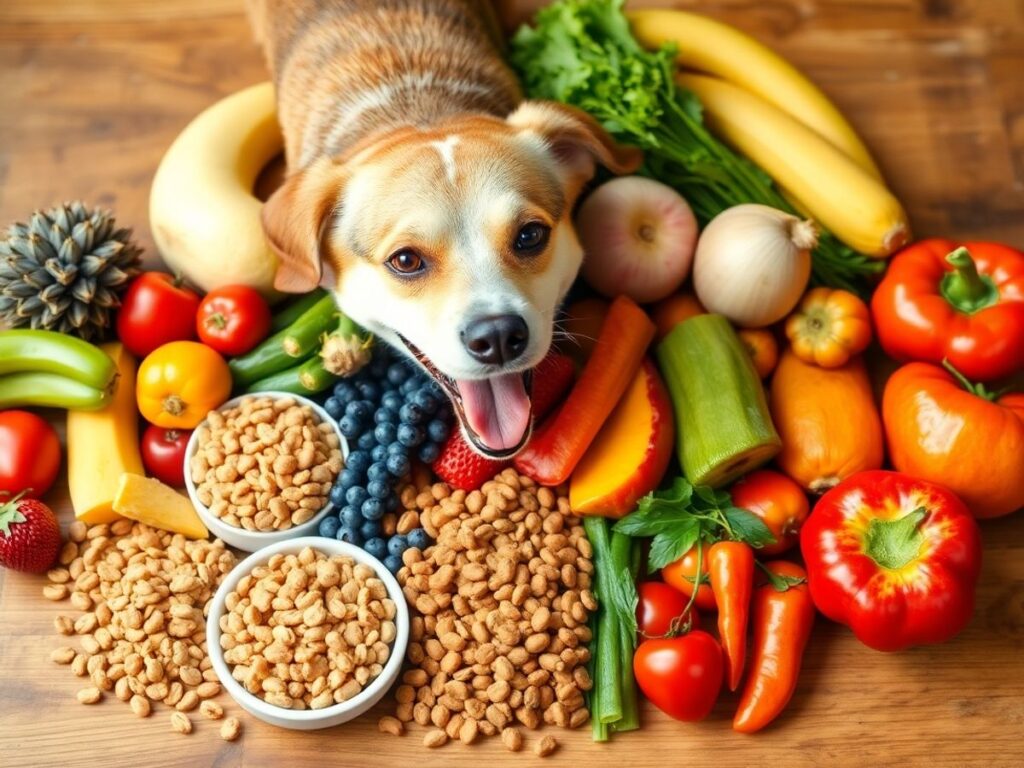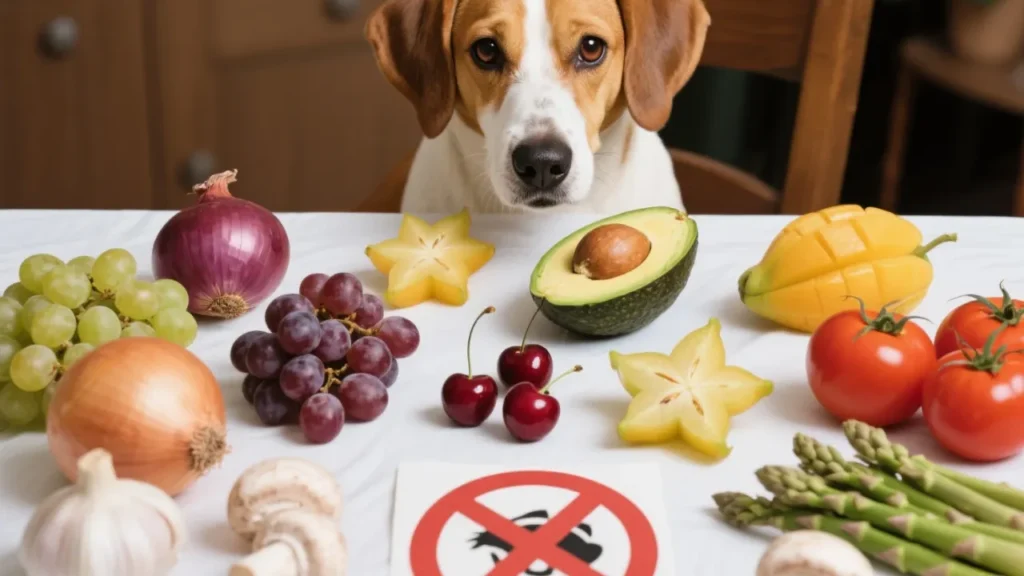Kitchen Safety Guide: Human Foods Dogs Can and Cannot Eat (Keep Your Pup Safe!
Those big, pleading eyes looking up at you while you’re eating… it’s hard to resist, isn’t it? Sharing a little tidbit from your plate feels like a simple act of love. We want to include our furry family members in everything, even mealtime. But while sharing can sometimes be okay, many everyday human foods pose serious risks to our canine companions. It’s heartbreaking to think that a seemingly harmless treat could lead to a vet visit or worse.
Knowing the difference between safe foods for dogs and dangerous toxic foods for dogs is absolutely essential for every dog owner. This isn’t about being stingy; it’s about responsible love and ensuring our dogs’ health and safety. Let’s navigate the kitchen together and create a clear guide on foods dogs can and cannot eat, so you can share safely or know when to firmly say “no” to those puppy-dog eyes.
Summary
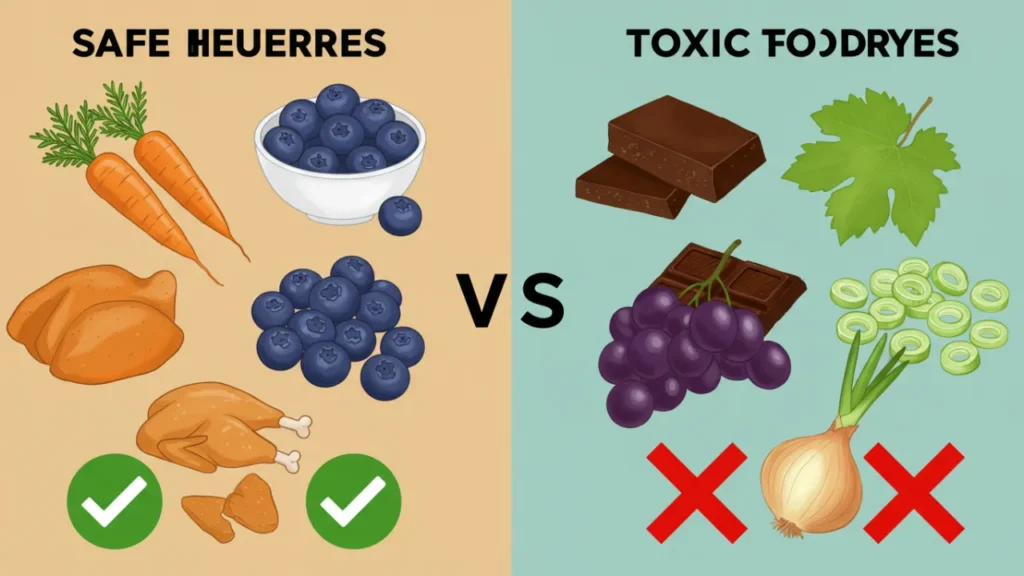
Why Can’t Dogs Eat Everything We Eat?
Dogs have different digestive systems and metabolisms than humans. Foods that are perfectly healthy for us can be difficult for them to digest, lack essential nutrients they need, or contain substances that are outright poisonous foods for dogs. Portion size also matters; even safe foods given in excess can cause digestive upset or contribute to obesity. Understanding dog nutrition safety means recognizing these fundamental differences.
FDA Role: The U.S. Food and Drug Administration (FDA) plays a role in regulating pet food safety (FDA dog food safety), ensuring commercial dog foods are safe and properly labeled. While they don’t regulate table scraps, their resources often highlight known toxins and safe handling practices, reinforcing the importance of careful feeding and knowing what not to feed dogs.
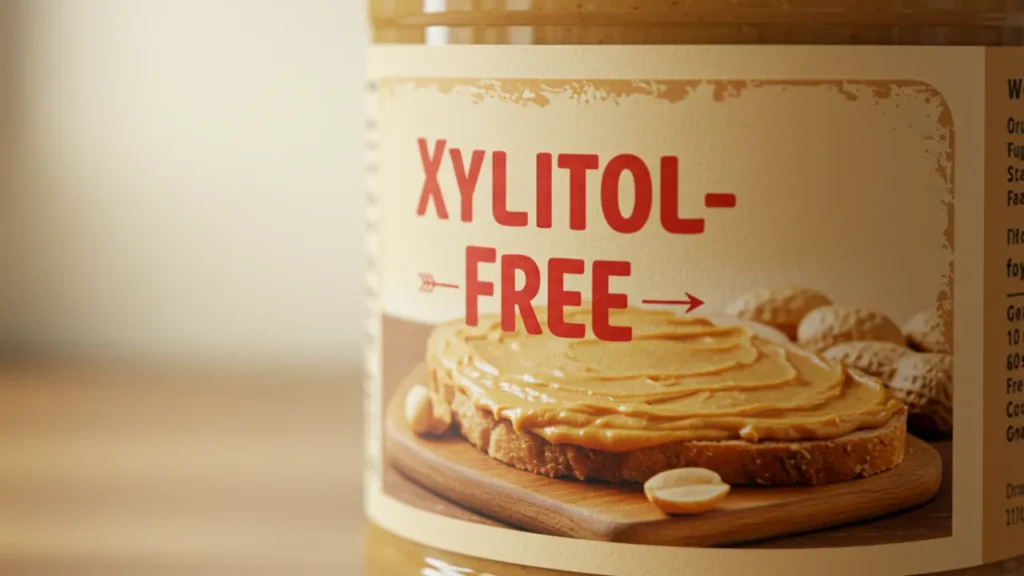
Safe Human Foods for Dogs (In Moderation!)
Many human foods dogs can eatcan be shared safely as occasional treats, provided they are plain and given in small quantities. Always introduce new foods slowly to watch for any digestive upset. Remember, treats should only make up a small percentage (ideally <10%) of your dog’s daily caloric intake.
Safe Fruits (Seeds/Pits Removed!):
- Apples (No Core/Seeds): Good source of vitamins A & C and fiber. Seeds contain cyanide.
- Bananas: High in potassium, vitamins, biotin, fiber. Give in moderation due to high sugar content.
- Blueberries: Superfood packed with antioxidants and fiber.
- Cantaloupe: Good source of water, fiber, and vitamins.
- Cranberries: Safe in small quantities (fresh or dried). Too many can cause stomach upset.
- Mango (No Pit): Packed with vitamins. Remove the hard pit (choking/cyanide hazard).
- Oranges (No Peel/Seeds): Good source of vitamin C. Peel/seeds can cause upset.
- Peaches (No Pit): Good source of fiber and vitamin A. Pit contains cyanide and is a choking hazard.
- Pears (No Core/Seeds): Good source of copper, vitamins C/K, and fiber. Seeds contain cyanide.
- Pineapple (No Rind/Core): Contains vitamins, minerals, fiber. High sugar, give sparingly.
- Raspberries: Contain antioxidants, lower in sugar. Contain tiny amounts of xylitol, so limit quantity.
- Strawberries: Full of fiber and vitamin C. High sugar, moderation is key.
- Watermelon (No Rind/Seeds): High water content, great for hydration. Contains vitamins and potassium.
Safe Vegetables:
- Broccoli: Safe in small amounts (florets mainly). High in fiber/vitamin C. Can cause gas. Stems can be choking hazard.
- Brussels Sprouts: Contain nutrients but can cause significant gas.
- Carrots: Excellent low-calorie snack high in fiber and vitamin A. Good for teeth.
- Celery: Low-calorie crunch with vitamins. May increase urination.
- Green Beans: Plain (steamed, raw, canned – no salt) are a good source of vitamins and fiber.
- Peas: Green peas, snow peas, sugar snap peas are okay. Contain vitamins/minerals/fiber. Avoid canned peas with added sodium.
- Pumpkin (Plain): Excellent source of fiber. Great for digestive health. Ensure it’s 100% plain pumpkin puree, NOT pie filling (spices/sugar).
- Spinach: Safe in small amounts (vitamins/iron). High in oxalic acid, limit quantity, especially for dogs with kidney issues.
- Sweet Potatoes (Cooked, Plain): Great source of fiber and vitamins. Must be cooked and plain (no butter, sugar, marshmallows!).
Safe Cooked Meats & Fish (Plain & Boneless):
- Chicken (Cooked, Boneless, Skinless): Excellent lean protein. Ensure thoroughly cooked, unseasoned.
- Turkey (Cooked, Boneless, Skinless): Similar to chicken. Avoid fatty skin and bones.
- Beef (Cooked, Lean): Cooked lean ground beef or small pieces of steak (trim excess fat) are okay in moderation.
- Salmon (Cooked): Great source of omega-3s. Ensure fully cooked (raw can contain parasites).
- Shrimp (Cooked, Shell Removed): Fully cooked, plain shrimp are okay occasionally. Low in fat, good source of antioxidants.
- Eggs (Cooked): Good source of easily digestible protein and vitamins.
Other Safe Foods:
- Peanut Butter (Unsalted, Xylitol-Free!): Good source of protein/healthy fats. CRITICAL: Must NOT contain xylitol (extremely toxic). Always check the label. Choose unsalted, natural varieties when possible.
- Yogurt (Plain, Low-Fat): Contains calcium and probiotics. Ensure no added sugars or artificial sweeteners (especially xylitol).
- Oatmeal (Cooked, Plain): Good source of soluble fiber. Cook thoroughly with water, no sugar/toppings.
- Rice (Cooked, Plain): White or brown rice, cooked plain, often used for bland diets during digestive upset.
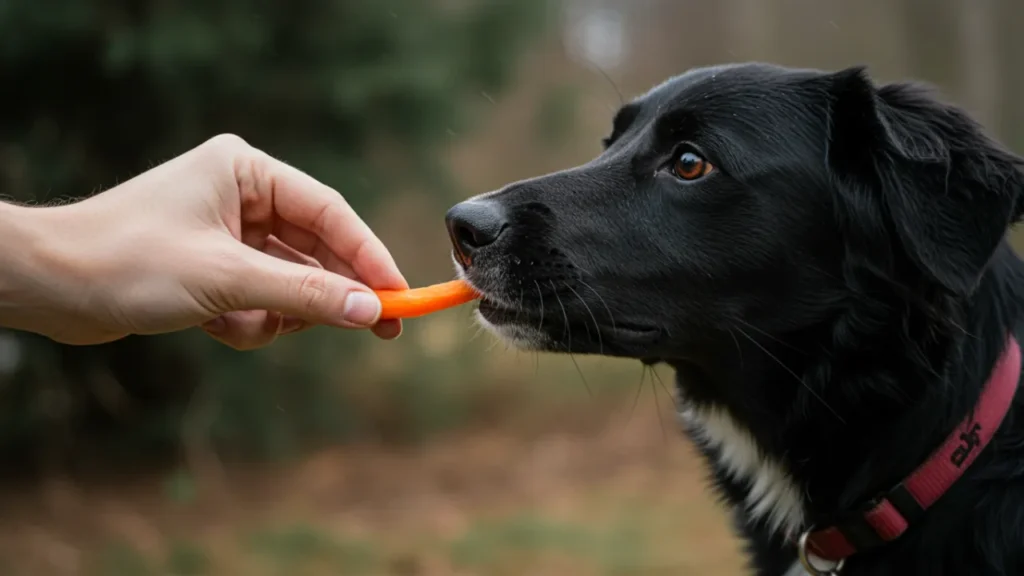
Toxic Foods for Dogs: DANGER ZONE! Keep These Away!
This list covers common poisonous foods for dogs. Ingestion can range from mild digestive upset to severe illness or death. Knowing what not to feed dogs is crucial for dog nutrition safety.
- Alcohol: Any amount is dangerous. Causes vomiting, diarrhea, coordination problems, breathing difficulty, tremors, coma, death.
- Avocado: Contains persin (mild toxin causing vomiting/diarrhea). Pit is a choking hazard and also contains persin.
- Chocolate (All Types): Contains theobromine and caffeine. Can dogs eat chocolate? Absolutely NOT. Dark chocolate, baking chocolate, and cocoa powder are most dangerous. Causes vomiting, diarrhea, panting, abnormal heart rhythm, tremors, seizures, death.
- Coffee, Tea, Caffeine (Any Source): Contain methylxanthines. Effects similar to chocolate toxicity.
- Citrus (Stems, Leaves, Peels, Seeds): Contain oils and citric acid causing irritation/CNS depression in large amounts. Small amounts of fruit flesh are less concerning but can cause upset.
- Coconut & Coconut Oil: Large amounts can cause stomach upset, loose stools, diarrhea due to high fat/oil content. Coconut water is too high in potassium.
- Grapes & Raisins: EXTREMELY TOXIC. Can dogs eat grapes or raisins? NO! Even small amounts can cause sudden, acute kidney failure. The exact toxin is still unknown.
- Macadamia Nuts: Highly toxic. Cause weakness (especially hind legs), depression, vomiting, tremors, hyperthermia. Signs appear within 12 hours.
- Milk & Dairy: Many dogs are lactose intolerant. Can cause diarrhea, gas, vomiting. Small amounts of plain yogurt/cheese might be tolerated by some.
- Nuts (Many Types): Besides macadamias, others like almonds, pecans, walnuts are high in fat (risk of pancreatitis, vomiting, diarrhea). Can also be choking hazards.
- Onions, Garlic, Chives, Leeks (Allium Family): Contain compounds damaging red blood cells -> anemia. Toxicity can be from one large dose or smaller repeated amounts. Garlic is less toxic than onions but still avoid.
- Raw/Undercooked Meat, Eggs: Risk of bacteria like Salmonella, E. coli.
- Bones (Cooked or Raw): Cooked bones splinter easily causing choking or internal injury. Raw bones also pose risks (choking, teeth fractures, internal blockage/perforation, bacterial contamination).
- Salt & Salty Snacks: Large amounts cause excessive thirst/urination, sodium ion poisoning (vomiting, diarrhea, tremors, seizures, death). Avoid chips, pretzels, salted popcorn.
- Xylitol (Artificial Sweetener): DEADLY POISON. Found in many sugar-free products (gum, candy, baked goods, toothpaste, some peanut butters, medications). Causes rapid insulin release -> severe hypoglycemia (low blood sugar), seizures, liver failure, death. ALWAYS CHECK LABELS!
- Yeast Dough (Raw): Rises in the warm stomach -> painful gas, bloating, potential GDV/bloat (stomach twist – emergency!). Yeast also produces alcohol.
What to Do If Your Dog Eats Something Toxic
Acting quickly can save your dog’s life.
- Stay Calm but Act Fast.
- Gather Information: Identify exactly what they ate, how much (estimate if needed), and when.
- Call Your Veterinarian or Pet Poison Helpline Immediately: Do NOT wait for symptoms to appear. Contact your local vet, an emergency vet clinic, or a 24/7 pet poison control center:
- ASPCA Animal Poison Control Center (APCC): (888) 426-4435
- Pet Poison Helpline: (855) 764-7661 (Note: Consultation fees usually apply for poison helplines, but they are expert resources.)
- Follow Their Professional Instructions Exactly: Do NOT induce vomiting unless specifically instructed by a vet/poison control expert, as it can be harmful with certain substances or conditions.
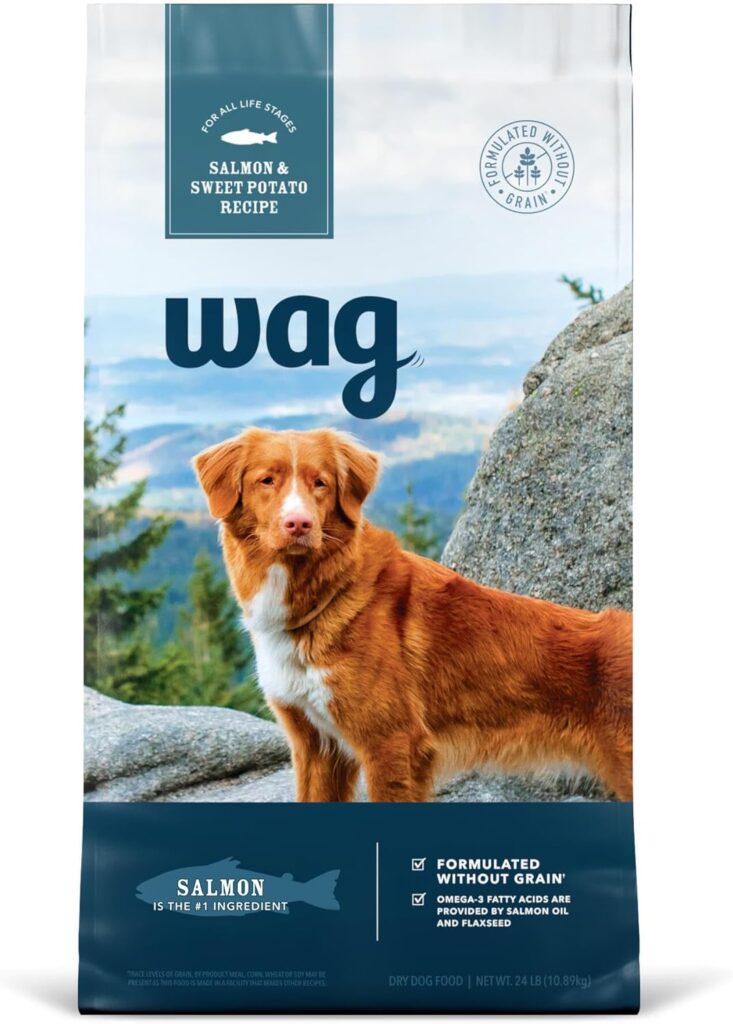
(Conclusion)
Sharing our lives with dogs often means sharing our homes and sometimes, the temptation to share our food. But ensuring dog nutrition safety requires constant vigilance.
Knowing which human foods dogs can eat safely in strict moderation and, more importantly, which toxic foods for dogs or poisonous foods for dogs must be avoided at all costs is crucial knowledge for every pet parent.
Keep this list of foods dogs can and cannot eat handy, meticulously check labels for hidden dangers like xylitol (especially in peanut butter and sugar-free items), and when in doubt, err on the side of caution and stick to high-quality commercial dog food and treats formulated specifically for them.
A little awareness and prevention in the kitchen go a long way toward ensuring a long, healthy, and happy life for your beloved canine companion. Remember what not to feed dogs is just as important as what to feed them.
(Bullet Points Summary – Enhanced for Readability)
- Different Needs: Dogs metabolize food differently; many human foods are unsafe or toxic foods for dogs.
- Safe Fruits (No Pits/Seeds, Moderation): Apples, bananas, blueberries, cantaloupe, mango, pears, watermelon are some safe foods for dogs.
- Safe Veggies (Plain, Moderation): Carrots, green beans, plain cooked pumpkin, plain cooked sweet potatoes.
- Safe Cooked Proteins (Plain, Boneless): Chicken, turkey, lean beef, salmon, shrimp, eggs.
- Other Safe Options (Moderation): Xylitol-free peanut butter, plain yogurt, plain cooked oatmeal/rice.
- HIGHLY TOXIC – AVOID: Chocolate (can dogs eat chocolate? NO!), Grapes/Raisins (can dogs eat grapes? NO!), Onions/Garlic family, Macadamia Nuts, Xylitol, Alcohol, Yeast Dough.
- Also Avoid/Limit: Avocado, Caffeine, Fatty/Salty Foods, Bones, Most Nuts, Dairy (common intolerance). This covers much of what not to feed dogs.
- Moderation is Crucial: Even safe foods for dogs should only be occasional treats (<10% of diet).
- Emergency Action: If ingestion of poisonous foods for dogs is suspected, call your vet or a pet poison helpline immediately.
- Check Labels: Always check for Xylitol in sugar-free products.
- FDA Role: The FDA oversees commercial FDA dog food safety.
**Sidnir Vieira**
Founder of TechHavela
A passionate pet and tech content creator, helping dog owners across the U.S. make smarter decisions for their furry friends.

